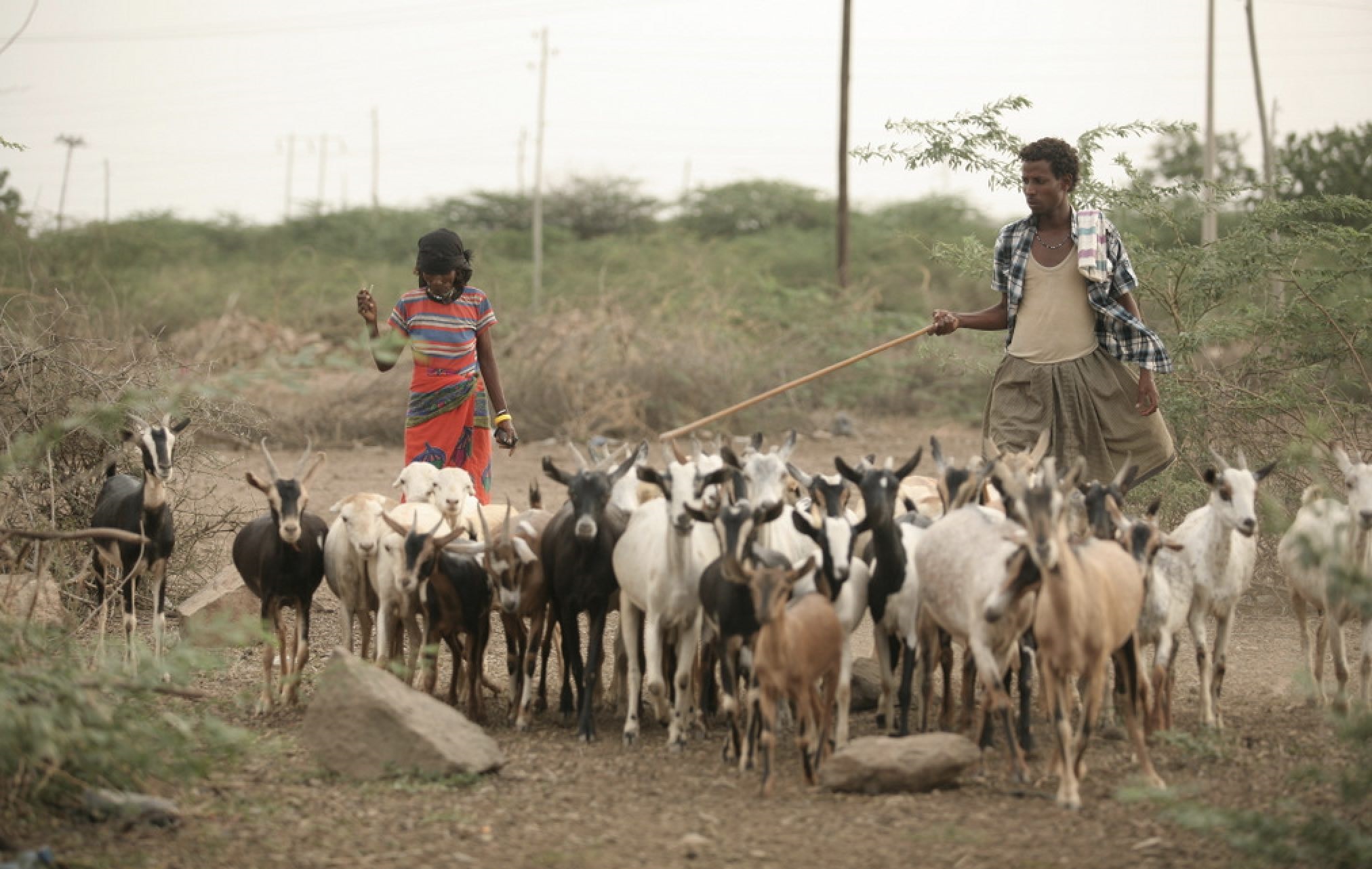Ethiopia enhances irrigation, watershed and pastureland management
Translating climate plans into actionable climate solutions
May 31, 2022
Photo Credit: ©FAO/AU/Yohannes Zirotti
In Ethiopia, changes in rainfall patterns are affecting smallholder farmers that are highly dependent on rain-fed agriculture and natural resources. Data collected over the past 50 years suggests that temperatures have increased by an average 1°C since the 1960s and that rainfall is subject to high variability between years, seasons and regions. The combined risks of water scarcity and recurrent droughts due to rising temperatures could increase the incidence of food insecurity and prompt population movements in search of natural pastures and water resources, implying that the pastoral and agro-pastoral activities in the country should adapt to the changing climate.
To strengthen national, regional and Woreda (district) level capacities to adapt to climate change, Ethiopia is implementing its National Adaptation Plan (NAP) which categorizes short-term adaptation priorities in the sectors considered most vulnerable to climate change, namely: agriculture, forestry, health, transport, energy, industry, water and urban. Ethiopia is working to integrate climate information into planning and decision-making for development interventions, and prioritizing climate resilience across policies. Its updated nationally determined contribution (NDC) submitted in July 2021 also outlines adaptation commitments focused on the agriculture and land use sectors, with a priorities identified in livestock diversification, drought-resistant animal breeding, rangeland management, crop, and livestock insurance.
Ethiopia has partnered with the FAO and UNDP Scaling up Climate Ambition on Land Use and Agriculture through NDCs and National Adaptation Plans (SCALA) programme (2020-2025), funded by the German International Climate Initiative (IKI), to further support the implementation of its NDC and NAP, focusing on climate action in the agriculture and land use sectors. In early 2022, Ethiopia officially launched the SCALA programme with an inception workshop that brought together key stakeholders from the Ministries, private sector and civil society institutions. The SCALA programme sat down with Negus Lemma, the Director General at the Climate Change and Biodiversity (EPA) and H. E, Wondale Habtamu, the Advisor of the Minister (MoA) in Ethiopia to learn more about the outcomes of the workshop and highlight the programme’s plans for the next five years.
***
SCALA: What are some of the key adaptation and mitigation priorities in agriculture and land use that have been outlined in your country’s NDC?
Negus Lemma - Director General; Climate Change and Biodiversity (EPA): “First of all, the agriculture and land use sectors in Ethiopia are extremely vulnerable to the impacts of climate change due to their reliance on rain-fed agriculture and natural resources, as well as their relatively limited adaptive capacity. In 2017, Ethiopia launched a fifteen-year National Adaptation Plan, which entails 18 adaptation options in the main vulnerable sectors. Some of these options are relevant to agriculture, forestry and other land use (AFOLU) and aim to improve the agricultural productivity in a climate-smart manner; strengthen sustainable natural resource management through safeguarding watersheds and landscapes; enhance sustainable forest management and improve early warning systems among others.”
SCALA: What are some of the main barriers experienced in achieving these adaptation goals?
H. E, Wondale Habtamu, Advisor of the Minister (MoA): “Climate change is not something we can push aside and ignore. It is a reality, and we need to pull together resources (technical, financial, and innovative technologies), knowledge and experience to cope with the challenges. Unless addressed systematically and, through a multi-stakeholder and multi-sectoral coordinated effort, climate change could negatively impact the country’s progress to transform. Therefore, these resources and coordination related challenges need to be addressed.”
Further discussions at the SCALA inception workshop in Ethiopia highlighted the need to build institutional and technical capacities to implement and scale up climate action. Additionally, there is a need to strengthen Monitoring, Reporting, Verification and Evaluation (MRV and M&E) by enhancing institutional arrangement. This will require adequate infrastructure and human resources for tracking the progress of climate adaptation and mitigation actions.
SCALA: Ethiopia is part of the 5-year SCALA programme. How can SCALA support the country in these efforts?
H. E, Wondale Habtamu, Advisor of the Minister (MoA): “I understand that the SCALA Programme is purposively designed to ensure sustainability in our climate response through supporting the implementation of the Climate-Resilient Green Economy (GRGE) transformative climate actions in the land use and agriculture sectors to reduce emissions and enhance adaptive capacity while enhancing collaboration between the public and private sectors as main drivers for implementation of those climate actions.”
The SCALA programme will support an integrated approach to NDC, NAP and CRGE implementation by enhancing national and sub-national capacity to plan, budget, track progress and mobilize finance for climate action in land use and agriculture sectors, particularly through community-based participatory watershed management. The programme can therefore support Ethiopia in its efforts of integrated natural resources management and related activities within the watershed system to enable improved irrigation, as well as small ruminants’ production. Small ruminant systems are particularly important because they will rehabilitate and protect pasturelands to improve feed availability and promote business in the production of small ruminants. Small ruminants have triple economic purposes, such as meat, milk and skin/hide and this will enhance nutrient security and create jobs.
***
The SCALA programme has a strong emphasis on transformative climate actions in the land use and agriculture to reduce GHG emissions and enhance removals, as well as strengthen resilience and adaptive capacity to climate change impacts in Ethiopia. Its specific objective is to support the country to translate its NDC, NAP and national climate resilience strategy into community-based watershed management through participatory methods, particularly through strong collaboration amongst federal and regional government bodies, civil society, academia and the private sector.

 Locations
Locations